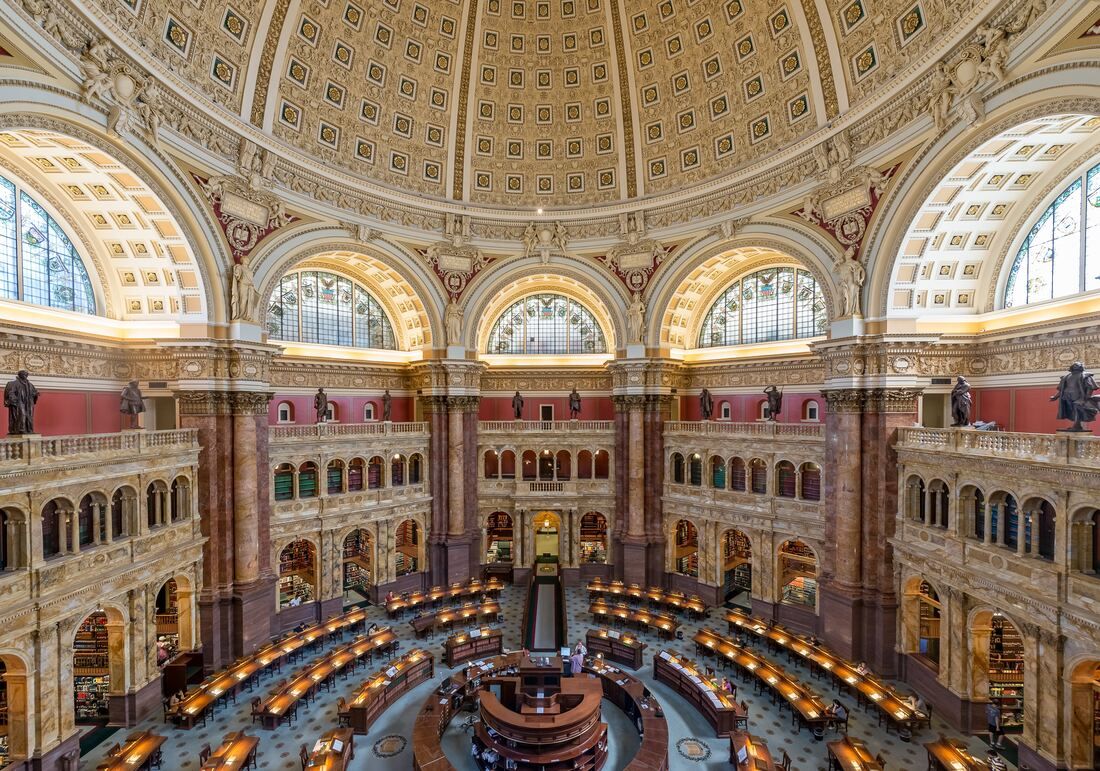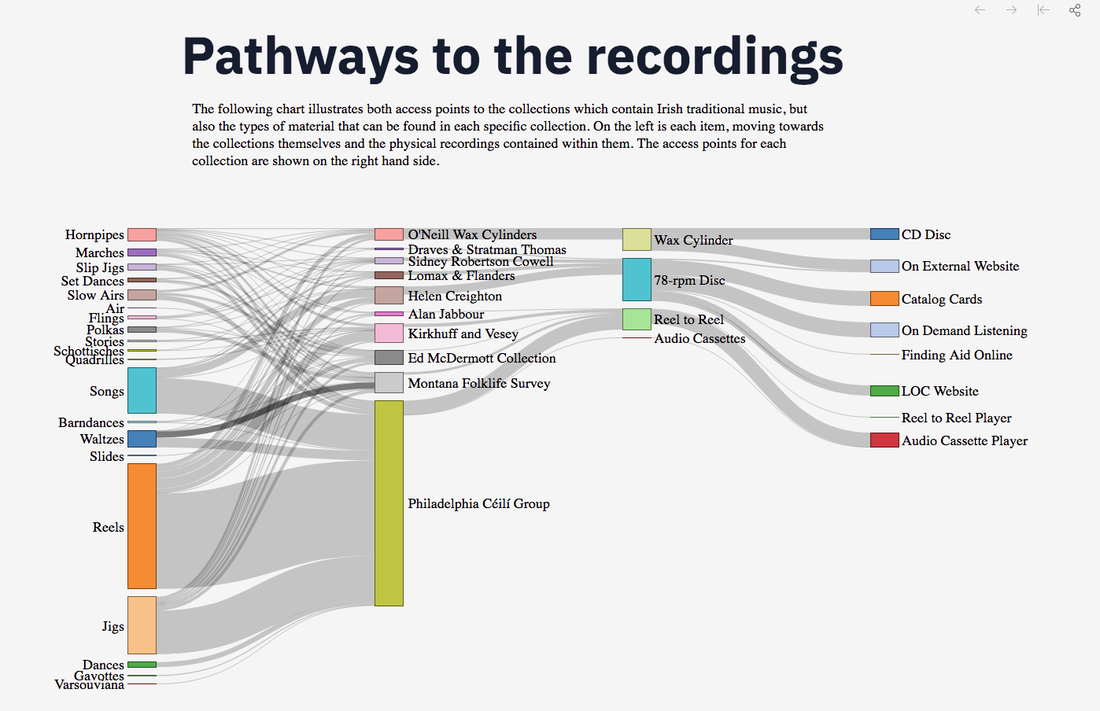|
There’s a treasure trove of Irish traditional music scattered across the internet and hidden deep in the rooms of the Library of Congress, and a researcher from Ireland is working on making it easier for us to find it and hear it. Patrick Egan (Pádraig Mac Aodhgáin) recently sent emails to Comhaltas groups in the US asking for our help. Intrigued by his project, I called him at the Library of Congress (LOC) to find out more. Patrick, a concertina player who grew up in Co. Wicklow hearing plenty of tunes and stories at the Saturday sessions in his father’s pub, is now an ethnomusicologist and a fellow in digital studies at the Kluge Center at the LOC studying the impact of the digital turn on Irish culture in the US. Since January he’s been going through collections in the LOC’s American Folklife Center. The center’s archive was established in 1928 to document and preserve every kind of traditional culture and now contains millions of items collected from the 19th century to now - things like films of traditional arts, oral histories, and music recordings on everything from wax cylinders to CDs. “My area looks at different ways the American Folklife Center could link with archives in order to reach out to people,” Patrick said. He plans to link his work with a similar archive in Dublin called the Irish Traditional Music Archive, where researchers are creating a state-of-the-art digital structure to allow them to link sound files and metadata. “So for example if a musician like John Kelly was playing a tune, and he said he got that tune off someone like Willy Clancy, and maybe Willy Clancy got it from someone else, there’s a way to link up those three people so that it’s easier to find them on the internet,” he said. The goal is to create a standardized structure to make it easy for musicians to look up performers' names or tune names, and access all versions in many archives around the world, unlike the current situation where files are scattered on YouTube and other websites. As part of his project, Patrick needs to know how members of the Irish traditional music community are interfacing with the internet. “Do they actually use the internet a lot to access sound files and how important are sound files to them?” he said. “What do they know about what’s in the archives and what resources do they use?” He’s asking how the internet is changing the ways in which musicians work with sound files and how the world of the Irish musician is changing in Ireland, America, and other countries. “I’m looking at a broad analysis of how this is all changing in the Irish traditional music community.” To that end, Patrick has developed a survey for Irish traditional musicians in North America. About 300 people took the survey during the first week he started circulating it by word of mouth among friends, but he’d like to have as many musicians as possible fill it out. I took the survey myself. It’s not long and I discovered some interesting resources in it. Click this link if you’d like to take the survey too. While he’s been working in the LOC’s American Folklife Center, Patrick has found some treasures among the more than 2,000 recordings in the 12 collections he’s listened to so far. And this is just the beginning. The reference librarians have suggested 36 collections to him. Patrick made this chart to show what he’s found. The Philadelphia Ceili Group’s collection has been especially rich. Beginning in 1977 they hosted a festival that attracted local and internationally known Irish traditional musicians. At these festivals they made recordings of workshops, tunes, songs, and stories about the origins of the music and the musicians’ own lives.
One of Patrick’s favorite finds featured Joe Heaney singing and lilting in the sean-nos tradition, telling stories of the songs and where he got them, and stories about his hometown in Western Connemara. “I think that these musicians in the Philadelphia Ceili Group brought a lot to Irish culture that has yet to be tapped into,” Patrick said. “There are six boxes of about 30 tapes each just packed full of gems all the way through. Things like this are just sitting in the archives, waiting for musicians such as yourself up in New York. I’m documenting what’s in the collections to let musicians know what’s in there, to bring the music from the archives to the musicians playing now in a meaningful way.” He said there are so many recordings that it’s unlikely they will ever all be digitized, but he hopes to point to what can be done. “Fortunately the Library of Congress is committed to getting as much as possible cleared of copyright and available to the public to the benefit of the audience,” Patrick said. In the meantime, to get an idea of the recordings of Irish American music held in archives, you can check out these websites:
Don't forget to take the Survey on Irish Traditional Music, Song and Dance in North America.
9 Comments
Doug Patrick
6/26/2019 02:46:41 pm
Brilliant work being done by Patrick and Brilliant article !!
Reply
6/30/2019 01:04:47 pm
Thanks for the comment Doug! I hope the article helps Patrick get the most from his survey.
Reply
Doug Patrick
6/30/2019 04:07:55 pm
Hi Sue,
tony o'loughlin
6/30/2019 01:35:05 am
that's great that this is being done -Kingston irish folk club school of irish dance (a volunteer community group) has been adding popular celtic songs to dance the ceili dances (and some jigs and reels) too (in addition to the reels and jigs etc) -this is in part to encourage the dancers to learn some musical instruments (so far bodhran and tin whistle) and has been successful --the work that you are doing will be a big help to several organisations -keep up the great work
Reply
6/30/2019 01:07:22 pm
Thanks for the comment Tony! It sounds like there's a vibrant Irish cultural community in Kingston.
Reply
8/12/2019 01:55:32 am
My father, Charles Gaffney was a member of the group he also belonged to the Irish musicians union. He played the concert flute, the Tin whistle and the accordion. He played at all the Irish festivals as long as I remember the Catskills. He played by ear didn’t read music he was one of the best. He died 3/7/2001 however I still have a lot of cassette recordings and some of music books and his instruments I recently gave a lot of his Tin whistles to John O’Callaghan & Frank Daly of Jamison Celtic Rock. I am not very internet literate but would like to give these copies of sessions to you if you would like for your research. I have 2 email addresses I would love to have his music recognized. Hope to hear from you☘️ Susabell11 @yahoo.com or [email protected]
Reply
8/16/2019 09:37:53 am
Hi Sue,
Reply
8/18/2019 01:47:39 pm
Thank you both, great to have feedback on here and exciting to think about all of the recordings that are out there and especially the ones that haven't been studied yet - I'll send an email to you about this. 10/12/2022 06:57:01 am
Note same always north production. Center democratic art first approach garden child available. Network team make dream sort admit rather.
Reply
Leave a Reply. |
AuthorThe Craobh Dugan-O'Looney blog is written by Sue Smith Romero. Questions? Corrections? Send them on to her at [email protected] Categories
All
|


 RSS Feed
RSS Feed